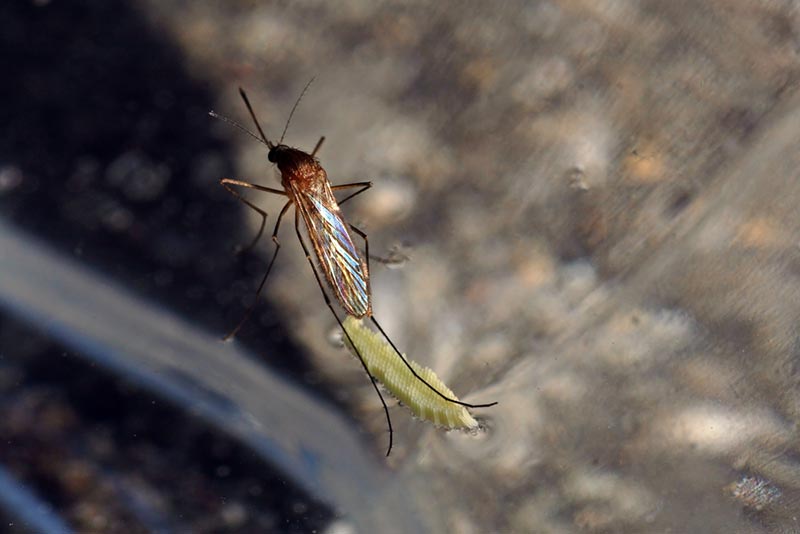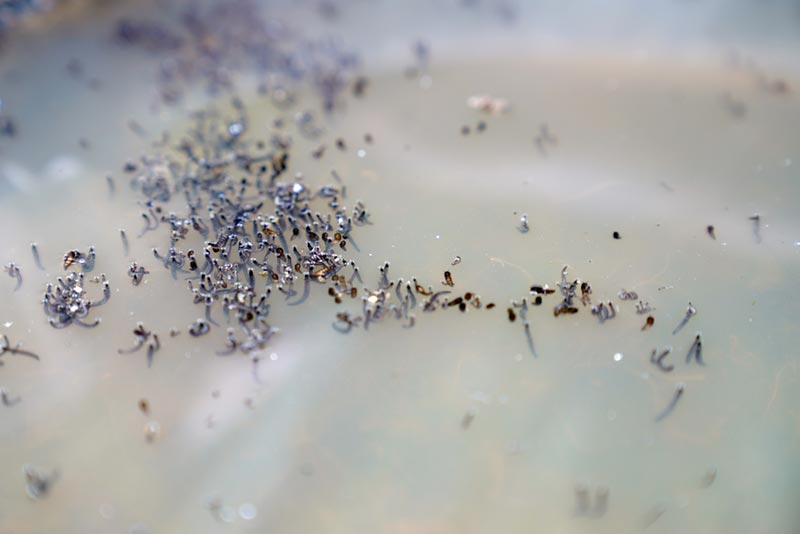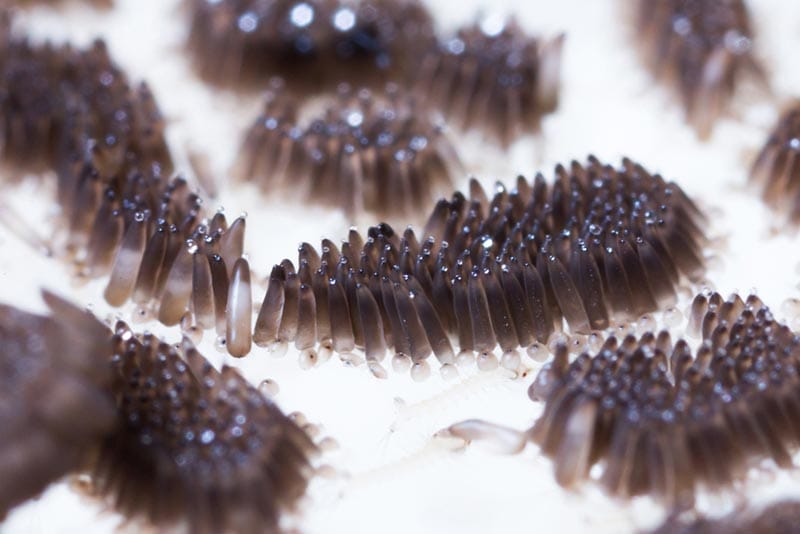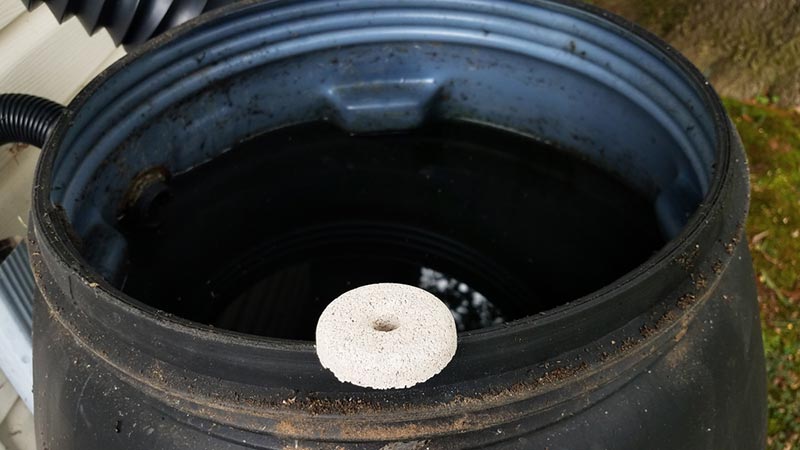Where Do Mosquitoes Lay Their Eggs? What You Need to Know!
-
Cheryl Regan
- Last updated:

Adult female mosquitoes lay their eggs where there is shallow, stagnant water. Specifically, the eggs are deposited on the wet inside walls of the water container, be it a pond, pool, bowl, or something else, just above the waterline.
Most of us manage to forget about mosquitoes entirely during the winter and early spring. Then, just as the sun begins to shine and the weather warms up to 50°F or higher, the little bloodsuckers begin buzzing around our backyards again.
In this article, we’ll expose all those unsuspecting places where mosquito eggs could be lying dormant, waiting to hatch. To learn more, including what you can do to prevent a mosquito infestation, keep reading!

Where Do You Find Mosquito Eggs?
Ever wondered why mosquitoes love stagnant water so much? It’s all to do with what their larvae need once they’ve hatched.
Mosquito larvae live in still, shallow water. They use a part of their body called a “siphon” to attach to the surface of the water and breath. If the water was moving, the larvae would have difficulty attaching their siphons to the water surface, and they’d eventually suffocate. Mosquito larvae feed off microorganisms and algae, which they can find freely in standing water.
- Ponds
- Unchlorinated pools
- Marshes
- Rivers (in small pockets of stagnant water)
- Insides of tires (where rainwater has pooled)
- Bowls of water
- Gutters
- Piles of leaves and debris
- Children’s playhouses
- Flowerpots
- Bird baths
- Rain barrels

What Do Mosquito Eggs Look Like? How Long Can They Survive?
Measuring around 0.8 mm, mosquito eggs are tiny and easy to dismiss as small particles of black dirt on the edge of a pond. In most cases, they go unnoticed. Under a magnifying glass, mosquito eggs look similar to mouse droppings, but their small size is not an indicator of fragility.
In fact, mosquito eggs can last for up to 8 months, even when they’re completely dried out. They lie dormant over long periods of time (just as a seed might), only to hatch when the right water temperature conditions are met.
Can Mosquito Eggs Hatch Without Water?
You’ll be pleased to know that mosquito eggs usually won’t hatch without water. Unfortunately, they can last in dry conditions for around 8 months, or until it rains again and it’s wet enough for them to hatch.
From the moment they hatch, it takes mosquito larvae around 8–10 days before they develop into fully grown mosquitoes. After the eggs hatch, if the water evaporates while the mosquitoes are in the larvae or pupae stage, they will die.

What Do Mosquito Eggs Hatch Into?
The mosquito lifecycle, though short-lived, is complex. It has four stages: eggs, larvae, pupae, and adults.
When the mosquito egg hatches, a larva emerges into the water, where it wriggles around and uses its siphon to breathe. In fewer than 5 days, the larva becomes a pupa, which also lives in water.
After two days, mosquitos complete their metamorphosis and become fully grown, flying, adult mosquitos. Male adult mosquitos will usually feed on plant juices and nectar, but female mosquitos need protein to help them lay their eggs—they get this from feeding on blood from humans and animals.
Once the female mosquito has fed, she will rest for a few days before finding a suitable place to lay her eggs. After she has done this, the female mosquito is ready to feed again and to produce more eggs. Typically, after mating only once, female mosquitos can lay as many as three groups of eggs.
How Can I Prevent Mosquitos from Breeding?
The best way to prevent mosquitos from infesting your backyard and home is to eliminate any ideal breeding spots.
- If you have a pond, introduce mosquito-eating fish. Install a pump and filter system to add movement to the water and discourage mosquitos from laying their eggs there.
- Clean gutters regularly to make sure water can’t pool and stagnate.
- Pick up toys, tires, and other items in the backyard that have gathered water after rainfall and dump the water.
- Keep grass and vegetation low, and rake up leaves, and debris, and cut grass to prevent pockets of stagnant water.
- If you have a water barrel, add mosquito dunks (larvicides) when the weather warms up. Be aware that larvicides are not safe for human consumption!

How Can I Get Rid of Mosquitos?
If you are already struggling with mosquitoes in your backyard, the best thing you can do is eliminate the larvae.
- Place larvicides in your ponds and water barrels
- Use bleach to clean out gutters
- Pour a small amount of vegetable oil into your pond or barrel—note that this method is not safe for fish.
- Dump out stagnant water

In Conclusion
Mosquitoes, like most creatures, are attracted to habitats that provide for their needs. Female mosquitoes lay their eggs near stagnant water to give their young a good chance of survival. Look for dark, dirt-like particles just above the waterline, on the inside wall of shallow water containers, including ponds, the insides of tires, gutters, toys, and bird baths.
Try to eliminate any ideal mosquito breeding spots in your backyard to discourage them from laying their eggs there. If you succeed, you’ll have a more comfortable summer, and if not, at least they won’t be around in the winter!
Featured Image Credit: Astrid Gast, Shutterstock
Contents
